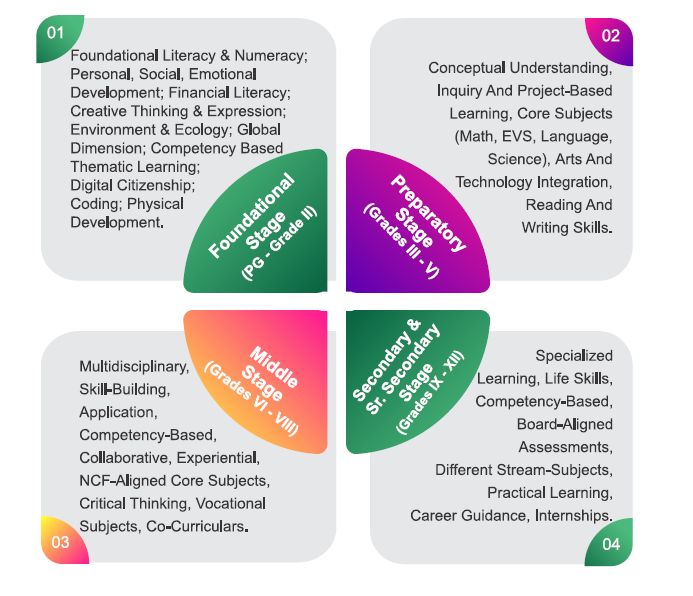Pedagogy
Pedagogy

Foundational (PG to II) and Preparatory Stage (III-V )
The early formative years often decide the love for learning throughout one's life. Therefore, at DPS, our curriculum is thoughtfully designed to retain students’ interest and help them recognise their inclinations. We lay strong emphasis on 21st-century skills. Our dedicated faculty works on fostering communication, collaboration, creativity, digital literacy, and global awareness.
- 1. Learning through Experience: Our students engage in real-world problems and projects that align with their age.
- 2. Student-Centred Approach: Every little child is unique and we celebrate their uniqueness. Our faculty tailors their teaching methods to meet individual needs and learning styles.
- 3. Collaborative and Cooperative Learning: When, in early years, students learn the art of collaborating in groups, they build teamwork and social skills.
- 4. Emphasis on Social Responsibility: To raise citizens of the world, we educate them from the very start and build a strong foundation of social responsibility.
- 5. Continuous Learning: We prepare students with the abilities and attitude needed for ongoing education. This guarantees that they can adjust in a constantly evolving world.
- 6. Liberty and Versatility: Learners are provided the liberty to pursue their interests and passions.
- 7. Emphasise the Holistic Development: Our educational method fosters the cognitive, emotional, social, and physical growth of every learner.
- 8. Minimising Rote Memorisation: At all stages of life, mugging up information doesn’t benefit; rather, understanding concepts and applying knowledge helps. So, we focus on reducing emphasis on memorising facts.
- 9. Active Inquiry: We encourage students to ask questions, explore ideas, and investigate topics to deepen their understanding.
- 10. Reflective Practice: Teachers engage in reflective practices, continuously refining their teaching methods to enhance student learning.
Middle Stage (VI-VIII)
Advancing from the preparatory stage, when our students move to the middle stage, we focus on offering a solid background for the upcoming classes. We are dedicated to creating a stimulating and engaging learning environment for students in grades 6 to 8. We implement the SMART (Specific, Measurable, Achievable, Relevant, and Time-Bound) framework to deliver structured, goal-oriented, and impactful learning experiences.
- 1. Specific Learning Goals We define clear, focused learning objectives aligned with curriculum standards. This helps students understand the purpose and application of concepts.
- 2. Measurable Progress Tracking Through continuous assessments, quizzes, and interactive activities, we track student progress. Structured feedback with assistance to improve upon weaknesses helps students head towards betterment.
- 3. Achievable Learning Milestones We believe in setting realistic goals rather than burdening the students. So, our personalised learning plans, remedial support, and differentiated instruction help every student reach their full potential.
- 4. Relevant Real-World Applications We incorporate real-life scenarios, experiential learning and interdisciplinary connections. Our technology-driven applications make all subjects meaningful and applicable.
- 5. Time-Bound Objectives & Efficiency
Lessons are structured with time-bound goals so that students complete tasks efficiently. Regular sessions and time management strategies help them balance their studies and attain academic success.
Key Focus Areas in SMART Learning
- 1. Experiential Learning: Through experiments, projects, and trips, our students deeply understand and retain concepts.
- 2. Blended Learning Approach: We integrate traditional methods with modern technology, including interactive digital content and online resources, to make learning engaging and accessible.
- 3. ICT & Digital Literacy: Students regularly engage in coding, animation, and programming fundamentals. We promote responsible internet usage and make them future-ready.
- 4. Co-Curricular & Real-World Applications: Students participate in clubs, Olympiads, model-making projects, and real-world problem-solving scenarios. Financial literacy is also integrated into the curriculum to enhance practical knowledge.
- 5. Life Skills Development: A focus on arts, music, sports, and extracurricular activities helps in developing leadership, social responsibility, and holistic learning.
Secondary and Senior Secondary Stage
With senior classes comes more responsibilities. At DPS, we ensure that every student of class IX and above is empowered with innovative teaching practices. We guide them to become active, self-motivated learners.
- 1. Experiential Learning: With difficult concepts comes the challenge to understand them better. We offer hands-on experiences that make learning practical and meaningful.
- 2. Blended Learning: We combine traditional and digital methods to ensure a flexible, modern, and engaging approach to learning.
- 3. Collaborative Learning: Our students engage in peer interactions and teamwork. Thus, they build essential social and communication skills.
- 4. In-demand skills and Entrepreneurship: We cultivate confidence and skills in our students so that tomorrow they innovate new things and meet the demands of the world.
- 5. Differentiated Instruction: We tailor teaching methods to meet the diverse learning needs of students.
- 6. Culturally Responsive Teaching (CRT): We integrate students' diverse cultural backgrounds into the learning process. Thus, we promote inclusivity and respect for diversity.
- 7. Scaffolding Difficult Concepts: Provides support and gradual release of responsibility to help students grasp challenging concepts.
